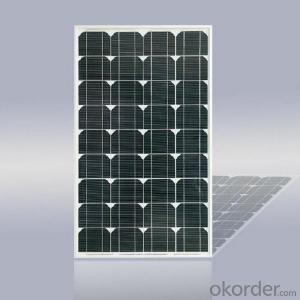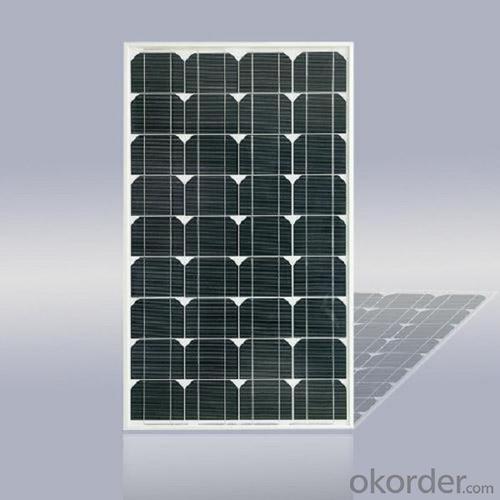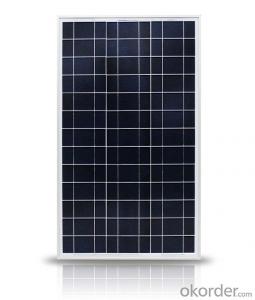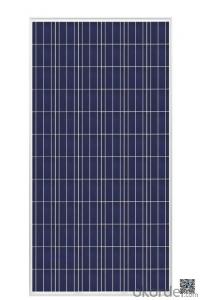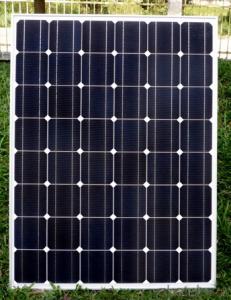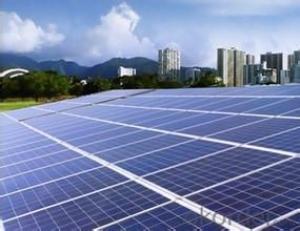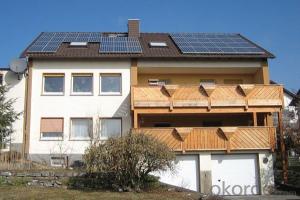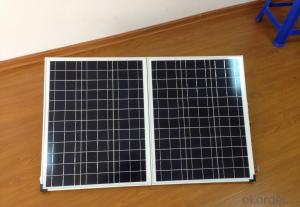Generac Solar Panels - Solar Panel Mono, Solar Module for Best Price in China
- Loading Port:
- Shanghai
- Payment Terms:
- TT OR LC
- Min Order Qty:
- 2600 watt
- Supply Capability:
- 26000 watt/month
OKorder Service Pledge
OKorder Financial Service
You Might Also Like
Specification
We now provide
• Monocrystalline Solar Panel
• Polycrystalline Solar Panel( multicrystalline silicon Solar Panel)
Features of our products:
• High conversion efficiency mono/poly-crystalline amorphous silicon solar cells
• Modules incorporate high performance bypass diodes to minimize the power drop caused by shading
• High transmittance, low-iron tempered glass
• High performance EVA encapsulant to prevent destroying and water.
• AI frame: without screw, corner connection. 8 holes on the frame can be installed easily
• Good performance of preventing from atrocious weather such as wind and hails
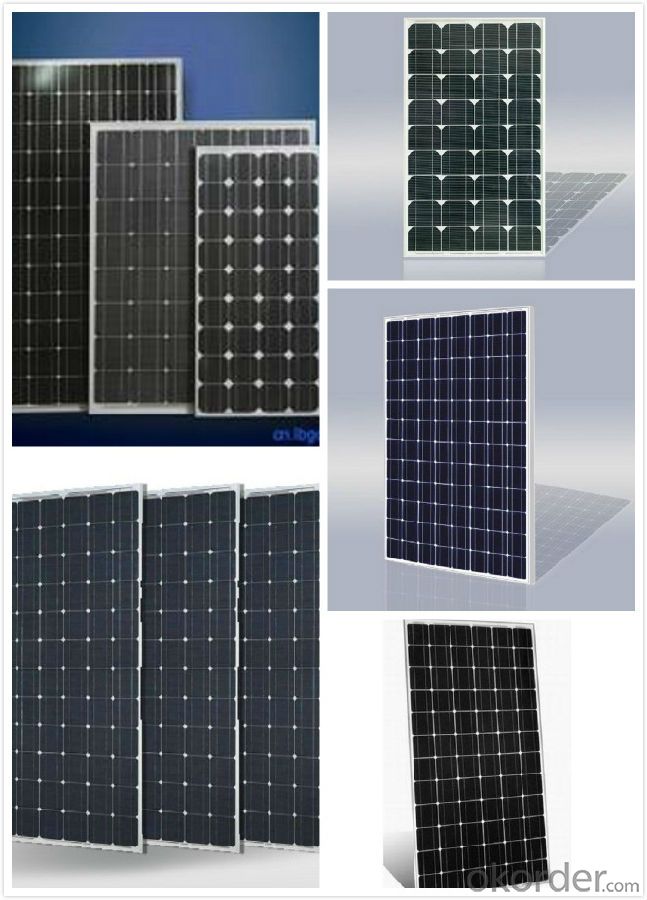
Product Description:
CUSTOMER does not assume responsibility and expressly disclaims liability for loss, damage, or expense arising out of in anyway connected with installation, operation, use or maintenance of the PV modules. No responsibility is assumed by CUSTOMER for any infringement of patents or other rights of third parties that may result from use of PV module.
CUSTOMER reserves the right to make changes to the product, specifications or installation manual without prior notice.
Solar panel working process
In addition to being the ultimate source of all life on earth, the sun is an infinitely renewable, completely pollution-free source of electricity. Instead of burning fossil fuels dug up from the ground in a big power plant – a very 19th century, industrial age approach, when you think about it – solar panels convert sunlight directly into electricity, with no harmful emissions.
The basic unit of a solar panel is a solar cell, which usually consists of one or two layers of silicon-based semiconductor wafers. When struck by the photons in sunlight, the solar cell generates an electrical charge due to the "photovoltaic effect" – which is a pretty good name, since it produces voltage from photons. The flow of these electrons moves in a steady electrical current from one side of the cell to the other.
Dozens of these PV cells are packaged together into solar modules, which in turn are packaged into solar panels that are mounted on a rooftop and arranged to maximize their hours of exposure to direct sunlight. Because the electricity generated by all those solar cells is direct current (DC), it is then sent to an inverter that transforms the power into the same alternating current (AC) used by the appliances in your home and the local utility electricity distribution grid. Increasingly, these inverters are getting "smart," providing data monitoring for solar installation performance and other grid integration services.
- Q: Why would someone use a solar panel? Does it have to do with the economy right now, global warming, or what?
- solar cell is a solar cell solar panel are many solar cells.... Typically people refer to a single solar panel as a solar panel, even though they should be reffering to it as a solar cell. A solar panel is a panel of solar cells working in conjunction with each other. I hope that makes sense it is just the incorrect terminology people always use.
- Q: I'm curious to know if the small solar panels on a calculator (ie TI-32) could produce a voltage similar to what is used in a single-use (disposable) camera, approximately 4V.
- Wrong forum
- Q: Didnt solar panels use to cost around $250,000 5 years ago?
- For just 5 years ago, certainly not! Perhaps you are thinking of 50 years ago, the kind that was put on the early communication satellites? 5 years ago, there was a glut of polysilicon, so modules were actually a little cheaper than today. Solar cell makers were basically using the scraps thrown away by chipmakers. But today, more silicon goes into making solar cells than computer chips, so that bonanza is gone. We will see prices going lower this year, possibly 20% from last year, because of improvements in technology, but also an increase in polysilicon supply, and a slowdown in demand due to worldwide recession. Later this year is a good time to buy panels, if you have the cash. The industry site below tracks module prices. They used to have more data, but I guess the old data rolls off the screen with time. If you want to see the details, they'll charge you for the report.
- Q: Can solar panels be used in urban areas with limited space?
- Yes, solar panels can definitely be used in urban areas with limited space. There are various innovative solutions available such as rooftop solar panels, solar panels integrated into building facades, and even solar panels installed on vertical structures like lamp posts or noise barriers. These compact and versatile options allow urban areas to harness solar energy efficiently, even with limited space.
- Q: What does it take to install the solar panel? Cable wires to power source or fuse box? Anything else?How does the cable wires stay on the solar panel?
- How does the cable wires stay on the solar panel? With wire retention clips (4 per module) that are used to wrap the wire on the underside of the module frame. The home run cables to the transition box (converts between types of wire with no electrical transformation occuring) or combiner box (joins multiple source circuits in parallel, with the positives fused for safety) are usually tied along the racking system components, and with conduit sections used as needed. Racking is another big part of the installation. Don't just make your own homemade wooden rack, as these will weather away to nothing very easily, and cause great failures. GET a professionally designed metal racking system. PV modules are EXPENSIVE. Don't let the racking system cause them to break. It also requires the inverter, if you intend it to connect to the main electric service. If using multiple inverters, you need an AC combining panelboard to join them prior to entering the main electric service. Otherwise, you need to think about how else you might be using them. If you are charging batteries, you need a charge controller.
- Q: What specification of solar panel would I need to power a laptop every day? I would need to use it for about 0 hours or so every day. I don't know anything about solar panels, but I am seriously thinking of getting one now and don't know who to ask.
- I okorder / says they have DC to DC solutions from 2 V for most laptops.
- Q: how much energy does solar panels save you? (like a month, year, etc)
- It depends on the size of the solar panels and the intensity of the solar-light. So, there's difference in every place. It's impossible to answer unless there's detail of panel size, panel quantities, average rainfall, average solar days, etc.
- Q: We are looking in to buy solar panels for our house. The payment has to be around or under $4000. Our house is a 4 bedroom and 3 bath 2-story house. (Around 2500 sq. ft.) Where can we get the solar panels? Also: Will it heat our water? When we get the solar panels, what direction do they have to be facing?
- yahoo store online
- Q: can solar panels be on houses? malls?stores? WHAT ABOUT TRAINS?
- Solar panels are an device that convert sun energy directly into electicity by photovoltaic effect,which is an physic and chemical phenomenon.solar panel can provide power for your home electical appliance instead of using electicity.
- Q: Have a 20V 40W solar panel and it is attach to two backup batteries. Just want to know know how many watt of inverter do I need?
- 500 Watt Solar Panel
Send your message to us
Generac Solar Panels - Solar Panel Mono, Solar Module for Best Price in China
- Loading Port:
- Shanghai
- Payment Terms:
- TT OR LC
- Min Order Qty:
- 2600 watt
- Supply Capability:
- 26000 watt/month
OKorder Service Pledge
OKorder Financial Service
Similar products
Hot products
Hot Searches
Related keywords
